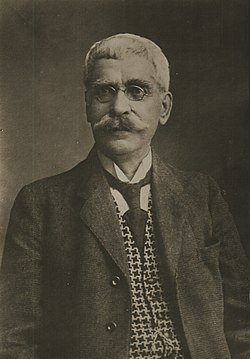| English: "Maritza/Maritsa Rushes" | |
|---|---|
| Шуми Марица | |
 | |
National anthem of the Principality of Bulgaria (1885–1908) National anthem of the Kingdom of Bulgaria (1908–1946) National anthem of the People's Republic of Bulgaria (1946–1947) | |
| Also known as | Bulgarian: „Черняев марш“ (English: "Chernyaev March") |
| Lyrics | Nikola Zhivkov, 1876 [1] Major revision in 1912 by Ivan Vazov [1] Minor revision in 1914 by Ivan Vazov [1] |
| Music | Alexander Kosmar, 1839 |
| Adopted | 1885 |
| Relinquished | 1947 |
| Succeeded by | "Our Republic, Hail!" |
| Audio sample | |
1910s recording using the original 1876 lyrics | |
" Maritza/Maritsa Rushes", [a] also known as the " Chernyaev March", [b] was the Bulgarian national anthem from 1886 until 1947. The music was derived from the German folk song Wenn die Soldaten durch die Stadt marschieren that was popular in Bulgaria during the mid-19th century. The original text was written by Nikola Zhivkov, a head teacher in Veles (now in North Macedonia). The lyrics were edited many times, most notably in 1912 by the poet Ivan Vazov. The title refers to the Maritsa, a river in the Balkans.
Contents
- History
- History of the melody
- History of the lyrics
- Usage of the anthem
- Status of the anthem in the Bulgarian People's Republic
- Proposals of the readoption of the anthem
- Performance of the anthem in the battlefield
- Russo-Turkish War
- Serbo-Bulgarian War
- Balkan Wars
- Lyrics
- 1914 revision
- 1912 revision
- Original version from 1876
- See also
- Notes
- References
- External links






